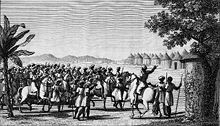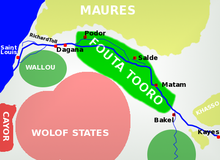- Futa Tooro
-
See also: Kingdom of Fouta Tooro
Futa Tooro refers to the region on the Senegal River in what is now northern Senegal and southern Mauritania.
The word Fuuta was a general name the Fulbe gave to any area they lived in, while Tooro was the actual identity of the region for its inhabitants. The people of the kingdom spoke Pulaar, a dialect of the greater Fula languages spanning West Africa from Senegal to Nigeria. They identified themselves by the language giving rise to the name Haalpulaar'en meaning those who speak Pulaar. The Haalpulaar'en are also known as Toucouleurs (var. Tukolor), a name derived from the ancient state of Tekrur.
The state of Denanke (1495/1514-1776) saw the origin of the modern Tukolor people. Migrations of the Fulbe left states in Fouta Tooro and Fouta Djallon to the south. In Fouta Tooro, the population became a unique mixture of Fula and Manding peoples who are today the Toucouleurs.
The region converted to Islam in the early eighteenth century. The rise of the Kingdom of Fouta Tooro in 1776 sparked a series of Islamic reform movements where small clans of educated Fula Sufi Muslims (the Toorobe) seized power in states across West Africa.
In the 1780s Abdul Kader became almaami (religious leader or imam) but his forces were unable to spread revolution to the surrounding states. [1]
The Kingdom of Fouta Tooro later became the inspiration and the prime recruiting ground for the jihads of Toucouleur conqueror al-Hajj Umar Tall and anti-colonial rebel al-Hajj Mahmadu Lamine. Despite resistance, the Futa Tooro was firmly in the hands of French Colonial forces moving from modern Senegal by 1900. Upon independence, the region's heart, the southern bank of the Senegal River was retained by Senegal. The north bank became part of Mauritania.
The great modern Senegalese musician and worldbeat star Baaba Maal comes from the town of Podor in the Futa Tooro.
References
Categories:- Geography of Senegal
- Senegal geography stubs
- Mauritania geography stubs
Wikimedia Foundation. 2010.


